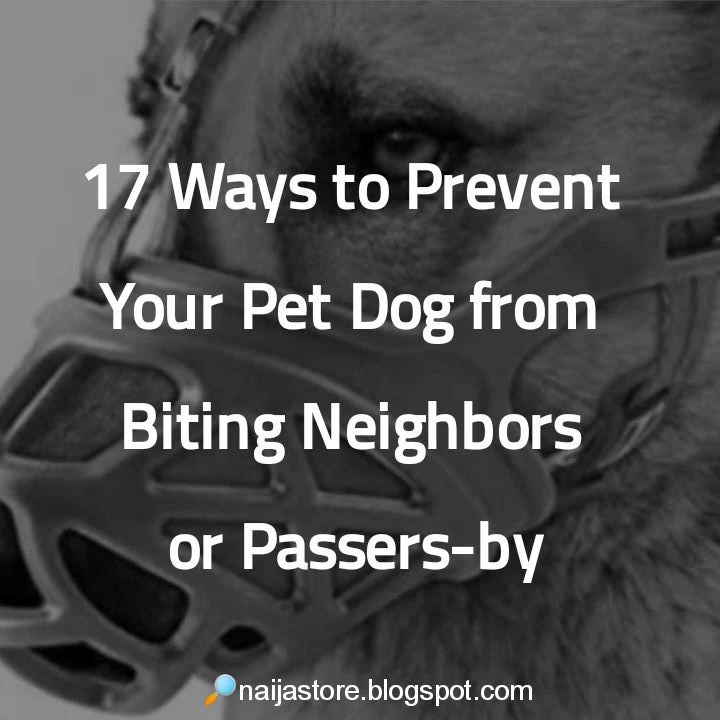
1) Get an Anti-Bite Muzzle:
If your pet dog is known to be aggressive or has a history of biting, or suddenly exhibits a change in behavior, using an anti-bite dog muzzle in public can prevent him or her from biting your neighbors or passers-by.
2) Leashing Your Dog:
You can keep your pet dog on a leash when in public to maintain control over its behavior and prevent him or her from biting passers-by especially the male dogs.
3) Stress Management:
Identify and address sources of stress in your dog's environment. This could include loud noises, changes in routine, or lack of socialization. Minimizing stressors can help prevent aggressive behavior.
4) Pet Social Training:
Socialize your pet dog from a young age and provide obedience training to teach him or her basic commands and good behavior. A well-socialized and trained dog is less likely to bite out of fear or aggression.
5) Supervise Interactions:
Always supervise interactions between your pet dog and others, especially children or strangers. Intervene immediately if you notice any signs of aggression to prevent potential biting.
6) Study Your Dog's Body Language:
Learn to understand your dog's body language to identify signs of fear or aggression and take appropriate action to prevent biting. Carefully study your dog's body language cues, such as stiff posture, growling, or bared teeth, that may indicate they are feeling threatened or uncomfortable. Address these signs promptly to prevent potential biting incidents.
7) Positive Reinforcement Training:
Use positive reinforcement techniques like treats, praise, and rewards to encourage good behavior in your pet dog. When they exhibit non-aggressive behavior, reward them to reinforce those actions.
8) Desensitization:
Gradually expose your dog to various stimuli such as strangers, other animals, or loud noises in a controlled environment. This helps reduce fear and anxiety, which can lead to aggressive behavior.
9) Create a Safe Environment:
Ensure that your home and yard are secure to prevent your household dog from escaping and encountering unfamiliar people or animals. This reduces the risk of bite incidents occurring outside your property or environment.
10) Vet Check-ups:
Regular visits to the veterinarian are essential to maintain your dog's health and identify any underlying medical conditions that may contribute to aggressive behavior. Addressing health issues promptly can help prevent biting incidents. Also ensure your dog is up-to-date on its vaccinations, especially rabies, to prevent the spread of disease in the event of a bite.
11) Consistent Boundaries:
Establish clear rules and boundaries for your dog's behavior and consistently enforce them. This helps your dog understand what is expected of them and reduces the likelihood of aggressive outbursts.
12) Enrichment Activities:
Provide your dog with interactive toys, puzzles, and activities to keep them mentally engaged and prevent boredom. Boredom can lead to behavioral issues, including aggression.
13) Provide Adequate Exercise:
Moreso, regular physical exercise and mental stimulation are vital for keeping your dog happy and healthy. A well-exercised dog is less likely to exhibit destructive behaviors, including aggression.
14) Avoid Punishment-Based Training:
Avoid using punishment-based training methods or techniques that may cause fear and aggression in your dog, leading to biting.
15) Check Stressful Situations:
Avoid putting your dog in stressful situations, such as crowded areas or around unfamiliar dogs, which may provoke aggression and biting.
16) Neutering / Spaying:
Neutering or spaying your dog can also reduce aggression and territorial behavior, making them less likely to bite.
17) Consult a Professional:
If your dog displays persistent aggression despite your efforts, seek guidance from a professional dog trainer, behaviorist, or veterinarian. They can provide personalized advice and strategies to address your dog's specific needs.
*For more understanding about dogs behavior, consult a certified dog specialist.
Remember, preventing dog bites requires responsible pet ownership, including proper training and supervision. By following these tips, you can help ensure your dog remains a safe and beloved member of the community.
*Need an anti-bite dog muzzle and other pet training kit? Check market stores..

Comments
Share Your Thoughts